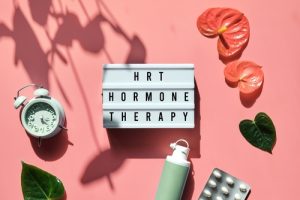Shoulder pain during menopause is a common problem that can be difficult to manage. In some cases, hormone therapy may be an effective treatment for easing the pain.
Hormone Therapy and Menopause
The transition to menopause can be a tumultuous time for many women. Hormone fluctuations throughout the years can cause various uncomfortable symptoms, including shoulder pain. Hormone therapy may help ease some of the discomfort that can come with menopause.
Hormone therapy is often prescribed to alleviate the physical and emotional symptoms of menopause. It works by restoring balance to hormones in the body, which often decreases the severity of many menopause symptoms. If you struggle with shoulder pain during menopause, speak with your doctor about whether hormone therapy could help relieve your pain.
What Are the Different Types of Hormone Therapy?
Two primary types of hormone therapy are typically used to help ease the symptoms of menopause: estrogen therapy and estrogen progesterone/progestin, or combination, therapy.
Estrogen Replacement Therapy
In estrogen replacement therapy, a low dose of estrogen is taken on its own each day. Typically, your doctor will try to prescribe the lowest dose of estrogen that works for you to ease any menopause symptoms. Estrogen replacement therapy can be administered orally via a pill, or through a patch, cream, gel, spray, vaginal tablet or vaginal ring.
Estrogen Progesterone/Progestin Therapy

Some women find that they do not need or want to take hormones after menopause and may choose to go without treatment. You must speak with your doctor about the best option for hormone therapy.
How Does Hormone Therapy Help Ease Shoulder Pain During Menopause?
There are many possible reasons why hormone therapy may ease shoulder pain during menopause. Studies have shown that hormone therapy can provide relief from both acute and chronic pain and may also improve nerve function. This is because hormones play an important role in the development of nerves, and when there is a hormonal imbalance, it can lead to nerve damage or dysfunction.
One of the most common benefits of hormone therapy for shoulder pain during menopause is decreased levels of inflammation. Inflammation is a process that helps your body fight infection and repair damaged tissues, but when it’s excessive, it can cause pain and swelling. In many cases, hormone therapy can help reduce inflammation levels, leading to reduced pain and better joint health.
Additionally, hormone therapy has been shown to improve blood circulation in the shoulder area. Poor blood flow can cause chronic pain in the shoulder due to the compression of nerves and other tissues. Hormone therapy has increased blood flow to the arm, helping to reduce inflammation and encouraging healing. Hormone therapy may also help to increase the levels of natural oxytocin, which has been shown to relieve pain.
When Should You Start Hormone Therapy for Shoulder Pain During Menopause?
Hormone therapy may be an effective treatment if you are experiencing shoulder pain during menopause. Hormone therapy can relieve pain and inflammation, improve joint function and decrease the risk of osteoporosis.
There are a few things to keep in mind when starting hormone therapy for shoulder pain during menopause:
- Your doctor must determine if you are eligible for hormone therapy. You may need bone health screenings before beginning therapy, as hormone therapy can increase your risk of developing osteoporosis.
- Hormone therapy is not always a simple process. You will likely need to take multiple medications throughout treatment. Your doctor will monitor your progress regularly to ensure you receive the most effective treatment.
- It is important to remember that hormone therapy does not cure shoulder pain during menopause. However, it can be an excellent tool for managing symptoms and improving overall quality of life.
While hormone therapy is not a cure for menopause-related shoulder pain, it can be effective. In particular, hormone therapy can help to protect against bone loss and improve joint function. It can also reduce the severity of hot flashes and other symptoms of menopause.
If you are experiencing shoulder pain during menopause, talk to your doctor about whether hormone therapy might be a good option.





